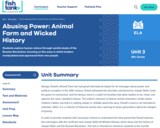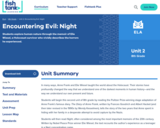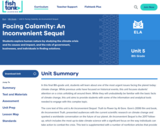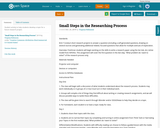Where does our food come from? How do we analyze arguments about how food should be grown and processed? What factors influence our access to healthy food? How do we research this? What factors should we prioritize when making choices about our food? How do we share these recommendations with others? In this module, students develop their ability to research, weigh different aspects of complex dilemmas, and formulate opinions supported by evidence and reasoning as they explore the topic Food Choices.
In the beginning of Unit 1, students discover this topic by examining multiple artifacts and being introduced to the guiding questions of the module and the culminating performance task. Throughout the module, students read excerpts from their anchor text, The Omnivore’s Dilemma, and they analyze video clips of the Nourish: Food and Community documentary. Students learn how to analyze the author’s purpose and point of view, as well as structural elements he uses to convey key ideas. In addition, students learn how to delineate and evaluate the author’s arguments by tracking his central claim, supporting points, evidence, and reasoning. Students evaluate whether the author’s evidence and reasoning are sufficient and sound and consider if and how he addresses conflicting viewpoints. Students then evaluate an author’s motives for conveying information and consider the advantages and disadvantages of using different mediums to do so. All of these skills further students’ abilities to be critical consumers of information and to be thoughtful about what is presented to them.
In Unit 2, students research GMOs and a second topic of their choice (pesticides, high-fructose corn syrup, organic food, or food deserts) that bring to light influences on Americans’ access to healthy food. Students learn new research skills as they explore ways in which access to healthy food can be increased or decreased. After researching GMOs as a whole class, students choose their own topic and utilize the research skills they learned in the first half of the unit to research their topic of choice. Students then write an expository essay on how their research topic impacts access to healthy food. At the end of Unit 2, students participate in a Desktop Teaching Activity that will allow them to teach a mini lesson on the topic they research, and to participate in their classmates’ mini lessons on other case studies.
In Unit 3, students analyze language used in The Omnivore’s Dilemma to better understand the author’s intended meaning. Students begin to consider the food choices at play in the many texts and topics they have examined and begin to formulate their own opinions about which food choice would be the most beneficial for themselves and those in their community. For the final assessment, students write an argument essay defending this recommendation. In preparation for this, students analyze a model essay, plan and draft a practice essay, and plan and draft their assessment essay.
For their performance task, students create an infographic and talking points to defend their argument. Students will present to an audience of community members in roundtable presentations.





